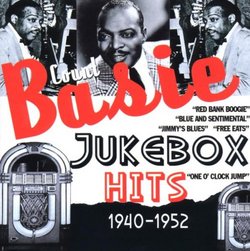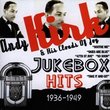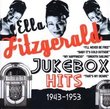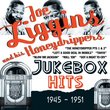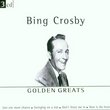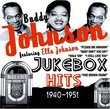| All Artists: Count Basie Title: Jukebox Hits 1940-1952 Members Wishing: 0 Total Copies: 0 Label: Import [Generic] Release Date: 12/23/2003 Album Type: Import Genres: Jazz, Pop Style: Swing Jazz Number of Discs: 1 SwapaCD Credits: 1 UPC: 824046402020 |
Search - Count Basie :: Jukebox Hits 1940-1952
CD DetailsSimilar CDs
|
CD ReviewsJazz Icon Exceeded By None 03/21/2008 (5 out of 5 stars) "As with the Muddy Waters, Duke Ellington, Ella Fitzgerald, Nat "King" Cole and Billie Holiday volumes in the Jukebox Hits series from Acrobat Music & Media Ltd. in the U.K., focusing on the greats of R&B and Jazz, this Count Basie release will not be found by anyone searching under artist. On the other hand, all the others in the series will be found that way, and these include Lucky Millinder, The Clovers, Erskine Hawkins, Andy Kirk & His Clouds Of Joy, Ivory Joe Hunter, Johnny Otis, Louis Jordan & His Tympany Five (2 volumes), Buddy Johnson, T-Bone Walker, Jimmie Lunceford, Lionel Hampton, Ruth Brown, and Billy Eckstine.
William (Count) Basie, born on August 21, 1904 in Red Bank, N.J., began his career as a pianist/organist with the Walter Page Blue Devils, followed by Bennie Moten's Kansas City Band from 1929 to 1935. When Moten passed away, Basie took over the orchestra and, from 1937 to 1968 would produce 37 Pop hit singles, seeing 8 also make the R&B charts (introduced in late 1942 as The Harlem Hit Parade) from 1943 to 1968. In this volume, which covers 1940 to 1952, you get all 18 he posted in that period, along with I Want A Little Girl (Okeh 5773 in 1940) and from 1952, the Verve release Paradise Squat, neither of which made any national charts. Before the first hit included here (Goin' To Chicago Blues - # 25 in September 1941 on Okeh 6244 with vocal by Jimmy Rushing), he had posted 7 hits while with Decca, one on the Vocalion label, and one on Columbia (the parent company of Okeh). Nothing ensued in 1942, but in 1943, and now with all releases being handled by the main Columbia label, Rushing was front and center again on Rusty Dusty Blues which hit # 6 R&B/# 18 Pop in May/June b/w All Of Me, which had Lynne Sherman doing the vocals, and which reached # 14 Pop on its own in July. The following January, the patriotic For The Good Of Your Country made it to # 21 Pop. with Rushing again on vocal. Tenor saxophonist Don Byas is featured on the foregoing 4 hits. A year later, in February 1945, Thelma Carpenter took over the vocal on I Didn't Know About You, which also topped out at # 21 Pop, while the instrumental B-side, Red Bank Boogie, got to # 6 R&B. Jimmy's Blues, once more featuring Rushing, went all the way to # 3 R&B and # 10 Pop in October 1945, and in January 1946 Ann Moore was the vocalist for Jivin' Joe Jackson, a # 12 Pop. Later that spring, the double-sided instrumental Patience And Fortitude b/w The Mad Boogie hit the Pop charts only at # 14 and # 10. Tenor saxophonist Illinois Jacquet can be heard on the latter, as well as on Blue Skies which, with Rushing singing, peaked at # 8 Pop that September. Then, in early 1947 and now with the Victor label, came the now-classic Open The Door, Richard which had no less than seven hit versions that year. The only # 1 Pop hits, however, were by The Three Flames and Count Basie, with the comical vocals handled by Harry Edison and Bill Johnson. It also reached # 2 R&B. A couple of months later, in April 1947, the instrumental Free Eats got to # 7 Pop, while in June a Decca re-release of his 1937 # 15 Decca instrumental hit, One O'Clock Jump, topped out at # 12 Pop. Not to be outdone, Victor then released One O'Clock Boogie, and in July that instrumental got as high as # 8 Pop. That August he had Taps Miller do the vocals on I Ain't Mad At You (You Ain't Made At Me), and saw it climb to # 7 Pop, while in January 1948 Bob Bailey sang Blue And Sentimental which tapered off at # 21 Pop. The last hit presented here is Robbin's Nest, a # 22 instrumental in March 1948 featuring Paul Gonsalves on tenor sax (who is also heard on the previous two hits). Basie, winner of the Grammy's Trustee Award in 1981, passed away from cancer at age 79 on April 26, 1964. This volume has excellent sound reproduction along with informative liner notes, and should be an integral part of any serious collection of Big Band music." |

